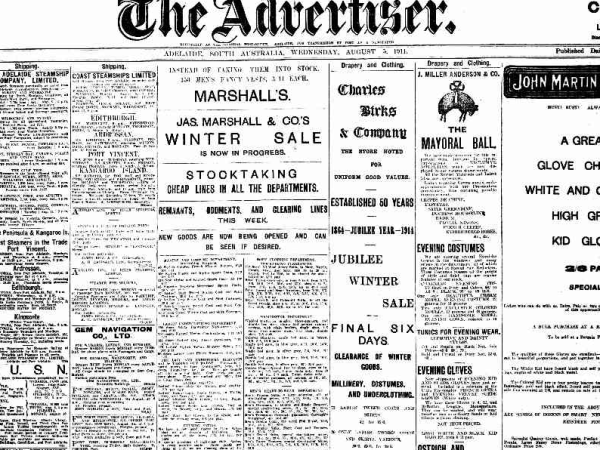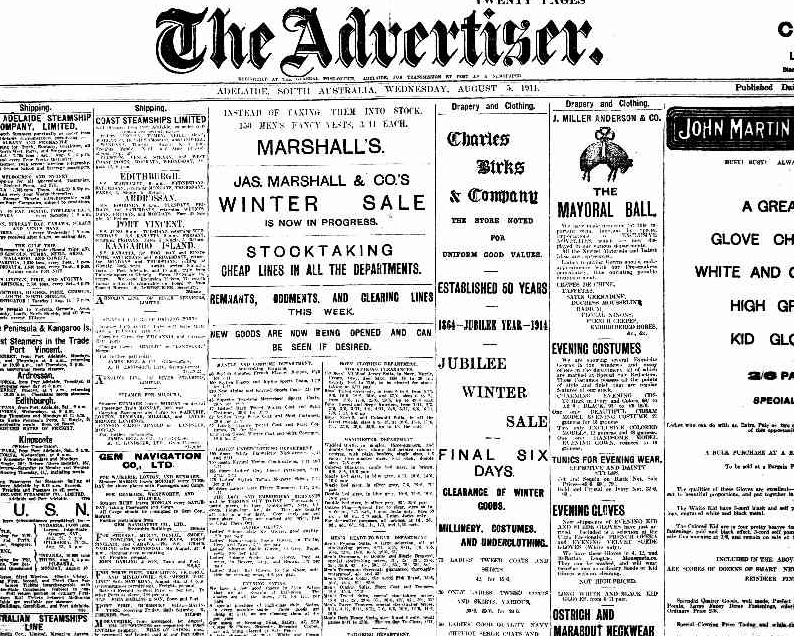Advertiser – October 1915
SHELLS FOR THE FRONT
TO BE MADE IN ADELAIDE
GOVERNMENT TO SUPPLY 50,000
In reply to a question by Mr. Cole in the House of Assembly on Thursday, the Premier (Hon C Vaughan) said the Government had decided to put in a tender for the manufacture of 50,000 shells, some of which would be made at the Islington railway workshops. There were now waiting for the settle, so that a start could be made with the work.
Friday 8 October p9
ANZAC DAY A SPLENDID SUCCESS
The Premier (Hon. C. Vaughan), who, like other Ministers, was here, there, and everywhere during Anzac Day, was delighted with the success of the arrangements for the great festival. “I think the public responded magnificently to the appeal,” he said in the evening.”In both the number of the crowd and the financial contributions the appeal has given the utmost satisfaction to the promoters of the scheme. The number of willing workers was legion, and the whole of the proceedings passed off harmoniously and successfully… The whole thing indicates that the well of self-sacrifice is by no means dry yet. The thanks of everyone are due to the large army of willing helpers who have worked hard all day, and of course, in a great many instances the work has not been confined to today, because the preliminaries entailed a deal of mental and physical labour. The women folk particularly have responded in a way that should win the everlasting gratitude of the people. So far as the procession was concerned, I think everyone will admit it was a big success The two outstanding features were the prehistoric troupe and the representation of the taking of Gallipoli heights, but the various trades displays were exceedingly good and reflected credit upon those responsible and were proof of the enthusiasm with which the unions entered into the scheme.”
Thursday 14 October p 8
THE WOMEN PATROLS.
The Chief Secretary (Hon. A. W. Styles) stated on Friday that he had received 53 applications for the two new positions in the police force to inaugurate the women’s patrol section. They were being carefully considered, and the selection would depend entirely on the merits of the candidates, as special qualifications were required. It was expected that the appointments would be made shortly, and that the women police officers would begin their duties on November 1.
Saturday 16 October, p14
THE AUSTRALIANS ON GALLIPOLI.
A NEW COMMANDER.
LONDON, October 19.
The War Office states that Major-General Charles Monro has been appointed to the command of the Allied troops on Gallipoli Peninsula.
General Sir Ian Hamilton is about to return to England to report to the War Office on the present condition of affairs in the Dardanelles.
General Sir W. Birdwood, who commands the Australian and New Zealand Army Corps, will control the whole army pending the arrival of General Monro.
Wednesday 20 October, p9
THE PENINSULAR WAR
FIGHT AT LONESOME PINE.A PERILOUS UNDERTAKING.
(From Captain C. E. W. Bean, Australian Official Press Representative.)
Gaba Tepe, August 16, 1915.
On the edge of the “Four Hundred Plateau” stood a solitary little pine tree. The battle lines wavered backwards and forwards across it, when the heath was fresh and green and the wild flowers in their bloom. Line after line of men swept across that heath-covered tabletop during the second afternoon in the face of fierce shrapnel and machine gun. The fight ebbed and flowed for hours. Finally the lines crystallised across it… The lone pine still stood behind the white line of the Turkish dump—a tattered relic…
Like a Game of Draughts.
The attack was timed for 5.30, and from half-past two the battalion were marching into place. The trenches at Anzac resemble the rambling corridors of a great old-fashioned home, with little dugouts in-stead of rooms, with shelves and niches blinded with waterproof sheet. From these there often protrudes the foot or arm of some worn out private, snatching a little sleep. There are little by-passages leading by a dim cellar, which is the company headquarters, or past a dug-out crammed to the mouth with files of pink and white message forms—battalion headquarters. There are blind alleys leading to sanitary arrangements and communication trenches. The moving of a brigade ready to rush from the front lines is like taking the moves in draughts. For the whole afternoon one met strings of men filing in and out of these deep, narrow passages in their red soil, strings filing east, strings filing west, strings filing across them…
Tuesday 12 October p9



